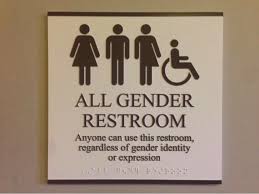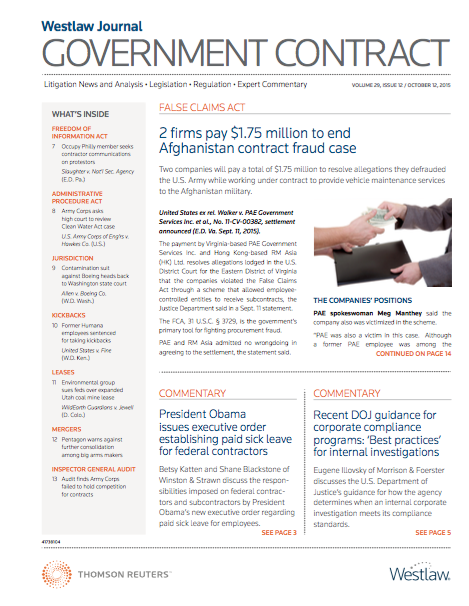On September 17, 2015, the U.S. District Court for the Eastern District of Virginia dismissed the Title IX claim of G.G., a transgender junior at Gloucester High School in Virginia who was born female but identifies as male.[1] G.G. alleged that the school board’s policy prohibiting him from using the boys’ bathroom violated the Equal Protection Clause and Title IX of the Education Amendments of 1972.[2] G.G. recently appealed the court’s decision to the Fourth Circuit on October 21, 2015.[3]
At the start of his sophomore year, G.G. was permitted by school administrators to use the boys’ restroom at his school.[4] However, some members of the community began to complain, and two months after granting G.G. this permission, the school board instituted a policy requiring students to use the restrooms and locker rooms that correspond to their “biological genders.”[5] The school board also required schools to provide transgender students with an “alternative appropriate private facility.”[6] The school subsequently installed three unisex, single-stall restrooms and made adjustments to its communal bathrooms, such as raising the doors and walls of bathroom stalls.[7] But G.G. has protested these requirements, arguing that he cannot use the girls’ restroom as girls and women would react negatively to his masculine appearance and that the use of the single-stall restrooms would cause undue stigmatism and isolation.[8]
On behalf of G.G., the American Civil Liberties Union (“ACLU”) and the ACLU of Virginia filed suit against the Gloucester County School Board, alleging that the bathroom policy is unconstitutional under the Fourteenth Amendment and discriminates on the basis of sex in violation of Title IX. They also filed a motion for preliminary injunction to enjoin the school from enforcing its policy and thereby permitting G.G. to use the boys’ restrooms at the start of the 2015-2016 school year.
In G.G. v. Gloucester County School Bd., the Eastern District of Virginia denied G.G.’s motion for preliminary injunction and dismissed the Title IX claim.[9] Title IX prohibits discrimination on the basis of sex in education programs or activities by recipients of federal financial assistance. Specifically, G.G. argued that the school board’s resolution violated Title IX by differentiating “between students who have a gender identity congruent with their birth sex, and those who do not.”[10] The court found that a Department of Education regulation, 34 C.F.R. § 106.33, permits schools to provide separate bathroom facilities on the basis of sex as long as the facilities are comparable, and a clear reading of the term “sex” includes biological sex.[11] It explained that this regulation “effectuate[s] Title IX’s provision allowing separate living facilities based on sex.”[12] The court held that because the school board’s policy of providing separate bathrooms based on biological sex was permissible under § 106.33, it did not need to determine whether the term “sex” in § 106.33 includes “gender identity.”[13] Furthermore, the court denied G.G’s motion for preliminary injunction, finding that he had failed to prove adequate proof of hardship.[14]
On October 21, 2015, the ACLU filed its appeal to the U.S. Court of Appeals for the Fourth Circuit.[15] The United States Government filed a friend-of-the-court brief in support of G.G..[16] A hearing is scheduled for January 27, 2016.
An “increasingly contentious issue”[17]
The Eastern District of Virginia is not the only jurisdiction considering the rights of transgender students to use the school bathroom or locker room associated with their gender identity, rather than their biological gender. Currently on appeal in the Third Circuit is a decision by the U.S. District Court for the Western District of Pennsylvania which held, in part, that a transgender college student did not have a Title IX discrimination claim because Title IX’s prohibition on discrimination “on the basis of sex” only refers to one’s biological sex.[18] The U.S. Department of Education clearly set forth its position on what has been called an “increasingly contentious issue” when it recently issued a finding that an Illinois school district violated Title IX by denying a transgender student athlete, who identifies as female, access to the girls’ locker room.[19]
Has Maryland weighed in?
On October 27, 2015, the Maryland Department of Education issued guidelines on non-discrimination and providing safe spaces and supportive environments for transgender and gender non-conforming students across the state,[20] which were lauded by the National Center for Transgender Equality.[21] The Department of Education acknowledged that “[p]erhaps the most difficult and sensitive issue school administrations will face is the bathroom and locker rooms.”[22] The guidelines suggest that schools systems permit access to the bathroom and locker room that corresponds to the student’s gender identity and that schools designate a unisex or gender-neutral single stall bathroom that may be used by all students. The Department also suggests that schools provide private, non-stigmatizing space for students who are uncomfortable with shared locker rooms or who desire increased privacy.
Maryland Senate Bill 212: The Fairness for All Marylanders Act, which went into effect last October, added “gender identity” to the list of protected classifications under the Civil Rights Law of Maryland and prohibits discrimination by places of public accommodation on the basis of gender identity.[23] However, schools are not considered “places of public accommodation” under the Act.[24]
The Maryland Department of Education acknowledged that the law has not settled on whether it is discriminatory to require transgender students to use a particular bathroom or locker room.[25] These policies are likely to develop and change over the next few years as the law develops not only in Maryland but across the country.
[1] G.G. ex rel. Grimm v. Gloucester County School Bd., 2015 WL 5560190 (E.D. Va. Sept. 17, 2015). The opinion may be found here: https://acluva.org/wp-content/uploads/2015/10/MemOp20150917.pdf.
[2] 20 U.S.C. §§ 1681, et seq. (1972).
[3] Brief of Petitioner-Appellant, G.G. v. Gloucester County School Board, No.15-2056 (4th Cir. Oct. 21, 2015), available at https://acluva.org/wp-content/uploads/2015/10/GG-CA4-OpeningBrFinal.pdf.
[4] G.G., 2015 WL 5560190 at *2.
[5] Id.
[6] Id.
[7] Id. at *3.
[8] Id. at *3-4.
[9] The court has not yet ruled on G.G.’s claim under the Fourteenth Amendment.
[10] G.G., 2015 WL 5560190 at *6.
[11] Id. at *6-7.
[12] Id. at *7. Title IX does not define the term “living facilities,” though the U.S. Department of Education has defined “living facilities” to include bathrooms. Id. at *7 n.7.
[13] Id.
[14] Id. at *15.
[15] Brief of Petitioner-Appellant, G.G. v. Gloucester County School Board, No.15-2056 (4th Cir. Oct. 21, 2015).
[16] Brief for the United States as Amici Curiae Supporting Plaintiff-Appellant, G.G. v. Gloucester County School Board, No. 15-2056 (4th Cir. Oct. 28, 2015).
[17]Mitch Smith and Monica Davey, Illinois District Violated Transgender Students’ Rights, U.S. Says, N.Y. Times, Nov. 2, 2015, http://www.nytimes.com/2015/11/03/us/illinois-district-violated-transgender-students-rights-us-says.html?_r=0.
[18] Johnston v. University of Pittsburgh of Com. System of Higher Educ., 2015 WL 1497753 (W.D. Pa. Mar. 31, 2015), appeal filed No. 15-2022 (3d Cir. Apr. 24, 2015).
[19] http://www.nytimes.com/interactive/2015/11/02/us/document-letter-from-the-us-dept-of-education-to-daniel-cates.html.
[20]http://www.marylandpublicschools.org/MsdE/divisions/studentschoolsvcs/student_services_alt/docs/ProvidingSafeSpacesTransgendergenderNonConformingYouth.pdf.
[21]Maryland, Federal Agencies Step Up for Trans Students, National Center for Transgender Equality (Nov. 3, 2015), http://www.transequality.org/blog/maryland-federal-agencies-step-up-for-trans-students.
[22]http://www.marylandpublicschools.org/MsdE/divisions/studentschoolsvcs/student_services_alt/docs/ProvidingSafeSpacesTransgendergenderNonConformingYouth.pdf.
[23] Md. Code Ann., State Gov’t § 20-101. The statute defines “gender identity” as “the gender-related identity, appearance, expression, or behavior of a person, regardless of the person’s assigned sex at birth, which may be demonstrated by: (1) consistent and uniform assertion of the person’s gender identity; or (2) any evidence that the gender identity is sincerely held as part of the person’s core identity. Id. § 20-101(e).
[25] For cases finding it discriminatory to mandate particular bathroom or locker room use, see, e.g. Doe v. Clenchy, No. 09-201 (Me. Super. Ct. April 11, 2011); Mathis v. Fountail-Fort Carson School District #8, No. P20130034X (Colo. Division of Civil Rights June 17, 2013). For cases finding it not to be discriminatory, see Johnston v. University of Pittsburgh, 2015 WL 1497753 (W.D. Pa., March 31, 2015); G.G., 2015 WL 5560190.




